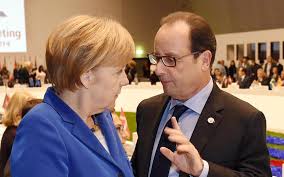Merkel to meet Hollande as Greece told to make next move

European officials are putting the onus on the Greek government to make the next move as Chancellor Angela Merkel heads to Paris Monday for talks with President Francois Hollande to map out a way forward for Greece.
With an emergency summit of European leaders called for Tuesday, fellow euro-region governments are preparing to wait for Greece to offer proposals that enable the country to stay in the 19-nation euro zone, according to a European government official with knowledge of the crisis strategy.
The coordinated approach suggests little appetite to bend to Greece, extending the brinkmanship that began with Prime Minister Alexis Tsipras’s January election on an anti-austerity platform and culminated in Sunday’s referendum. While official statements reacting to the “no” vote expressed respect for the choice exercised by Greek voters, they also stressed the need for Tsipras to say how he’ll resolve the uncertainty ahead.
“It’s now up to the Greek government to make proposals about how to proceed,” Austrian Chancellor Werner Faymann said in a statement on Monday.
A possible overture was made by Athens as Greece’s Finance Minister Yanis Varoufakis quit the same day citing “a certain preference” among European creditors that he no longer be involved in aid negotiations.
With the euro and stocks dropping Monday, Europe prepared for another week of emergency diplomacy to counteract one of the greatest challenges to face the common currency area.
ECB Credit
European Commission President Jean-Claude Juncker is due to hold a conference call Monday with European Central Bank head Mario Draghi and Jeroen Dijsselbloem, who heads the Eurogroup of euro-area finance chiefs. The ECB’s Governing Council is also due to talk later on Monday with a decision pending on what to do about Greek lenders that are dependent on its emergency credit.
“The result is very regrettable for the future of Greece,” Dijsselbloem, who is also Dutch finance minister, said in a statement calling a Eurogroup meeting for Tuesday. “For recovery of the Greek economy, difficult measures and reforms are inevitable. We will now wait for the initiatives of the Greek authorities.”
Merkel will meet with Hollande at 6.30 p.m. in Paris “to jointly assess the situation after the Greek referendum and to address the continuation of Franco-German close cooperation in this matter,” according to a statement. The leaders of Europe’s two biggest economies agreed that the referendum result was “to be respected.”
Debt Load
France has consistently argued for Greece’s debt load to be addressed, whereas Merkel has been less willing to countenance further debt relief. Tsipras put forward a plan on the eve of Sunday’s referendum for a 30 percent reduction in Greece’s debt.
“I’ve always said discussions on the debt are not taboo,” French Finance Minister Michel Sapin said on Europe 1 radio. Even so, “the vote itself won’t fix anything,” he said. “This is first and foremost a problem in Greece. It’s up to Mr. Tsipras to make some proposals as quickly as possible.”
More than 60 percent of Greek voters backed the government recommendation to reject the terms of bailout aid set down by creditors. The result strengthens Tsipras and repudiates leaders including Juncker who urged Greeks to vote “yes” or risk tumbling out of the euro.
European Consequences
The outcome “carries consequences not only for Greece, but also for the people in creditor countries and for the whole European project,” Maltese Prime Minister Joseph Muscat said in a statement. “The Greek government has sought to protect its people’s interest using the method it deemed best. People in creditor countries now expect their representatives to protect their interest and the European interest too.”
By unraveling more than five years of crisis fighting, the referendum result poses an existential dilemma for Merkel and fellow leaders over how to resolve an increasingly acrimonious standoff with Greece’s Syriza-led government without alienating domestic voters in Germany and elsewhere.
Helping Greece
Ingrid Arndt-Brauer, who chairs the finance committee in Germany’s lower house, said that she had expected her committee to be summoned on Tuesday to begin the process of helping Greece with a new bailout package in the wake of a “Yes.” The “No” vote rules out any such move.
“Nobody wanted to torture the Greeks — we’re not terrorists — but to help them,” said Arndt-Brauer, a lawmaker with Merkel’s Social Democratic coalition partner. “A ‘Yes’ vote would have signaled a readiness to cooperate — some reforms at least for fresh help. I see no credible basis to help Greece right now, none at all.”
Xavier Bettel, the prime minister of Luxembourg and holder of the European Union’s six-month rotating presidency, said it is up to the Greek government to make concrete proposals on the way forward.
“Europe is strong and I’m sure that we will also find solutions,” he was cited as saying in an interview with Deutsche Presse-Agentur.
[Bloomberg]





